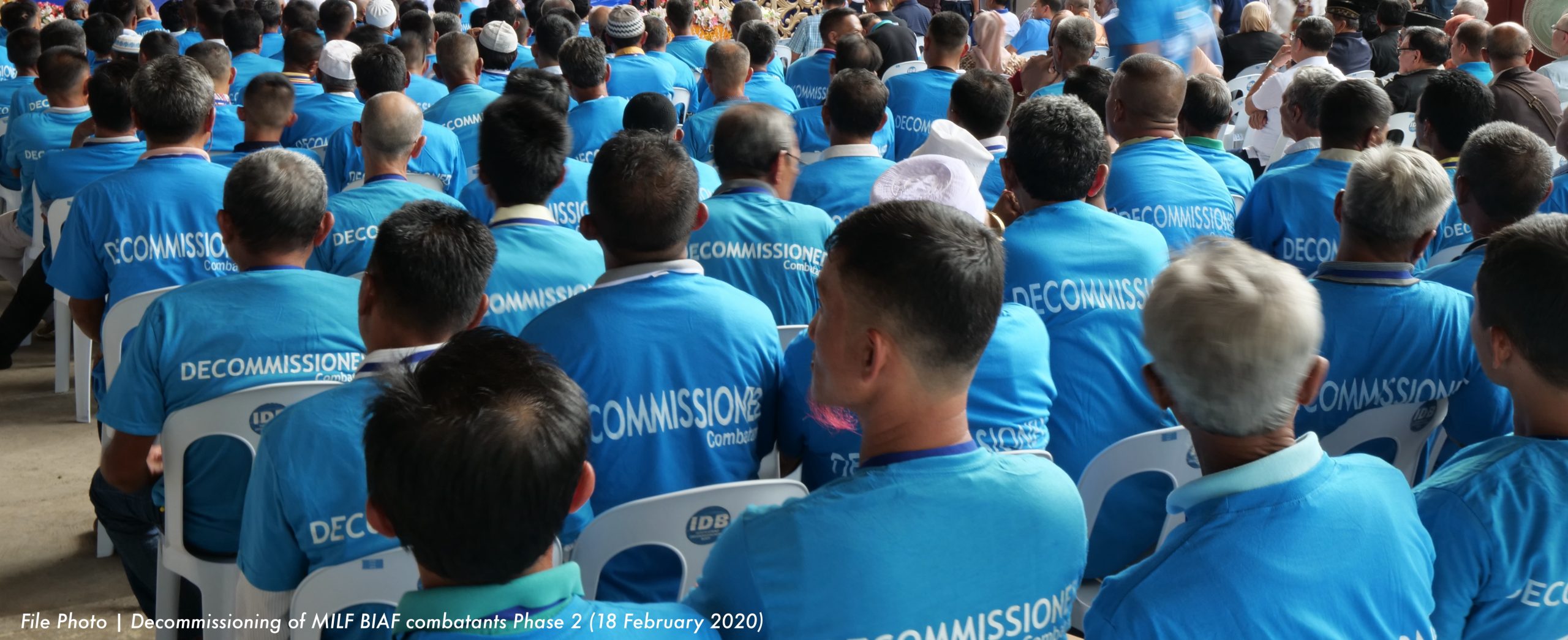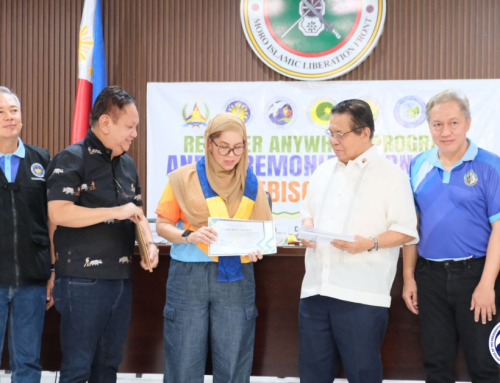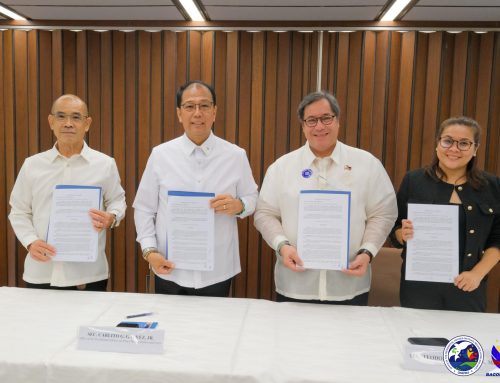PASIG CITY — The Philippine Health Insurance Corporation (PHIC) has included in its proposed budget for FY 2022 the enrolment for health insurance premium of 14,000 Moro Islamic Liberation Front – Bangsamoro Islamic Armed Forces (MILF BIAF) members who will undergo the third phase of decommissioning.
In the proposed budget totalling PhP 58.8 million, the annual premium contribution per member (combatant), including their qualified dependent, was placed at PhP 4,200.00.
This is in addition to the premium health coverage given to the 12,145 MILF-BIAF members who were decommissioned under Phases 1 and 2 in 2015 and 2019-2020, respectively.
The Office of the Presidential Adviser on the Peace Process’ (OPAPP) request for the inclusion of MILF members in PhilHealth’s coverage is pursuant to Executive Order No. 79 which established the Inter-Cabinet Cluster Mechanism on Normalization (ICCMN).
The ICCMN is anchored on the Duterte Administration’s Whole-Of-Nation approach to ensure the timely, appropriate and efficient delivery of programs and projects under the Normalization Program of the CAB.
A welcome development for meaningful transformation
Presidential Peace Adviser Carlito G. Galvez, Jr. said the good news from PHIC President and Chief Executive Officer Atty. Dante A. Gierran that MILF members have been included as PhilHealth beneficiaries is a “welcome development in the Bangsamoro peace process.”
“We are pleased that PhilHealth has favorably considered our request and included in their proposed FY 2022 budget the premium health care for the MILF BIAF combatants” Galvez said.
“We are sure this will be positively received by our legislators who have been closely monitoring developments in the peace process, particularly those happening under the Normalization Track,” he added.
Galvez explained that the premium health insurance for the former combatants will form part of the socioeconomic package to be provided for them under the Program on Normalization.
“In order for our decommissioned combatants to become productive civilians, we have to provide them with much-needed basic services that will help uplift their socio-economic well-being,” Galvez stressed.
“Health insurance is one of the most important benefits under the socioeconomic package, especially now that the country is in the midst of a pandemic where people need health coverage,” he added.
OPAPP Undersecretary David Diciano, chair of the Government Peace Implementing Panel for the Bangsamoro Peace Accord, said that the forging of institutional partnerships among line agencies through the ICCMN is a major milestone of the Bangsamoro peace process.
On April 24, 2019, President Rodrigo Roa Duterte signed EO 79 “Implementing Annex on Normalization under the Comprehensive Agreement on the Bangsamoro.”
“Since its creation, the ICCMN has achieved significant milestones, particularly in pooling resources from various line agencies through its sub-clusters, and leveraging them so that we can fulfill our commitments under the Annex on Normalization,” Diciano pointed out.
“The GPH peace panel expresses its gratitude to PhilHealth for partnering with us so that we can help our MNLF brothers and sisters make the successful transition to peaceful and productive civilian life and uplift their socio-economic well-being,” he added.
The ICCMN is co-chaired by OPAPP and the Office of the Cabinet Secretary representatives, together with 17 other member-agencies.
Normalization programs in full swing
The four components of the Normalization Track under the CAB include security, socio-economic development, confidence-building measures, and transitional justice and reconciliation.
Among the major accomplishments under each component are the following:
Under the security component, the Joint Peace and Security Committee (JPSC) will soon establish more Joint Peace and Security Teams (JPSTs), which includes the JPST soon to be set up in Brgy. Pangao, Munai in Lanao del Norte.
To date, 316 JPST members have been officially activated and deployed across the region.
JPSTs are tasked to help maintain peace and order in areas mutually-agreed by the GPH and MILF Peace Implementing Panels.
Meanwhile, the National Task Force for the Disbandment of Private Armed Groups (NTF-DPAGs) has disbanded eight private armed groups operating in the province of Maguindanao and General Santos City within the first two quarters of this year.
Also under the security aspect is the program for small arms and light weapons (SALW) in which the OPAPP organized a series of consultation meetings provincial governments to obtain their support and design a program that would encourage the active participation of residents in reducing and managing the number of SALW in their respective localities.
In November 2020, OPAPP signed Memoranda of Agreements with the provincial governments of Cotabato and Maguindanao, and the municipality of Patikul in Sulu, wherein OPAPP turned over a total of PhP 43.5 million in funds to the LGUs in recognition of their significant role in peacebuilding and in support of their programs on dispute resolution.
Under the socioeconomic development component, the Task Force for Decommissioned Combatants and their Communities (TFDCC) continues to provide rice subsidies to decommissioned combatants.
The distribution of these rice subsidies is being carried out by the TFDCC in partnership with the United Nations Development Programme (UNDP).
The assistance aims to ease the burden among the 12,145 decommissioned combatants and their families who have been affected by the COVID-19 pandemic.
The TFDCC, together with the Department of Social Welfare and Development (DSWD), is conducting a needs assessment of decommissioned combatants and their families to determine what their specific needs are so that the joint task forces will be able to plan and provide the appropriate socioeconomic interventions for them.
Under the confidence-building component, the Joint Task Forces for Camps Transformation (JTFCT) Secretariat is working on the completion of the implementation of the Tulong Panghanapbuhay sa Ating Disadvantaged/Displaced Workers (TUPAD) program of the Department of Labor and Employment (DOLE) for MILF communities.
In adherence to COVID-19 health protocols, the program beneficiaries will be provided with TUPAD IDs and reference numbers so they can claim their cash-for-work payment through DOLE’s remittance partner.
Meanwhile, the Camps Transformation Plan (CTP) was completed in January 2021 and was presented to the GPH-MILF Peace Implementing Panels in February 2021.
The CTP will be the basis for the socioeconomic interventions to be carried out in the six acknowledged MILF camps.
Also under confidence-building is amnesty, wherein the House of Representatives signified its concurrence to President Rodrigo Roa Duterte’s proclamations that grants amnesty to members of four local revolutionary groups including the MILF.
And under the transitional justice and reconciliation component, a series of dialogues on TJR was conducted in Bangsamoro communities to raise the people’s awareness on the subject.
In March of this year, the proposed TJR Roadmap was approved by the ICCMN and was officially transmitted to the MILF Peace Implementing Panel for review.
The list of 14,000 MILF combatants to be decommissioned under phase 3 was turned over by the MILF to the Independent Decommissioning Body (IDB) in December 2020. ###











